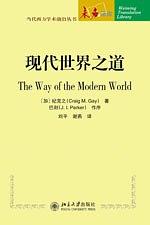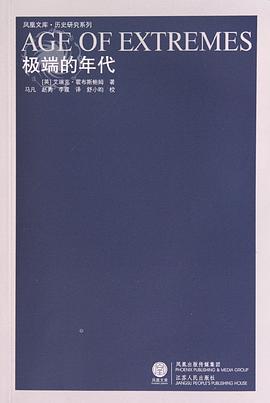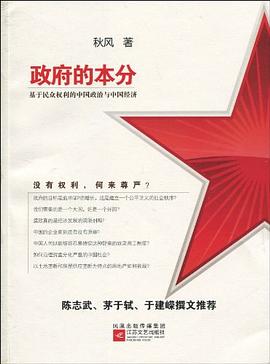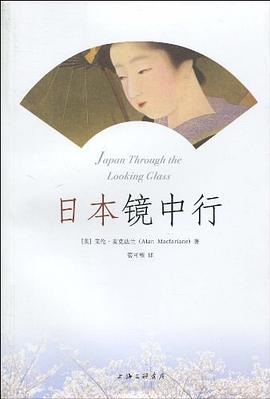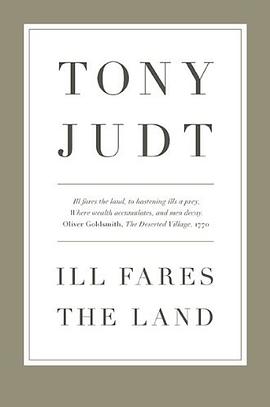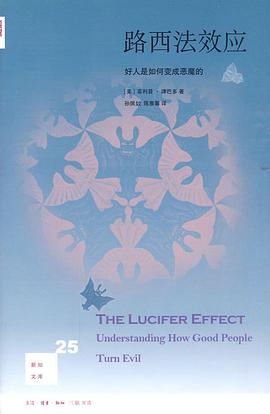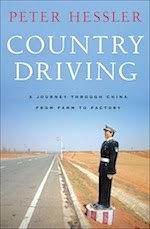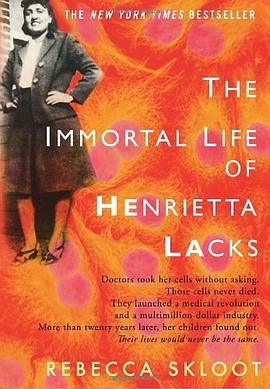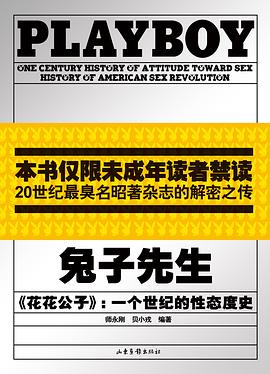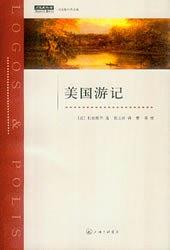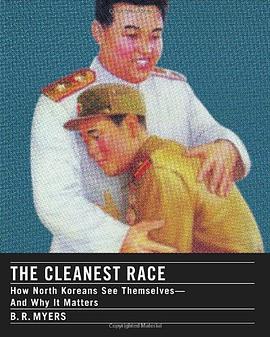
具体描述
Life is getting better—and at an accelerating rate. Food availability, income, and life span are up; disease, child mortality, and violence are down — all across the globe. Though the world is far from perfect, necessities and luxuries alike are getting cheaper; population growth is slowing; Africa is following Asia out of poverty; the Internet, the mobile phone, and container shipping are enriching people’s lives as never before. The pessimists who dominate public discourse insist that we will soon reach a turning point and things will start to get worse. But they have been saying this for two hundred years. Yet Matt Ridley does more than describe how things are getting better. He explains why. Prosperity comes from everybody working for everybody else. The habit of exchange and specialization—which started more than 100,000 years ago—has created a collective brain that sets human living standards on a rising trend. The mutual dependence, trust, and sharing that result are causes for hope, not despair. This bold book covers the entire sweep of human history, from the Stone Age to the Internet, from the stagnation of the Ming empire to the invention of the steam engine, from the population explosion to the likely consequences of climate change. It ends with a confident assertion that thanks to the ceaseless capacity of the human race for innovative change, and despite inevitable disasters along the way, the twenty-first century will see both human prosperity and natural biodiversity enhanced. Acute, refreshing, and revelatory, The Rational Optimist will change your way of thinking about the world for the better.
作者简介
马特·里德利
Matt Ridley
著名科普作家、牛津大学动物学博士,曾任《经济学人》专栏编辑。著有多部获奖作品,包括《人类基因组》、《灵敏基因》、《红色皇后》等。目前居住在英国。
目录信息
读后感
悲欢的流言比乐观的期望更能够吸引大家的眼球,人们总感觉到它无处不在,特别是近一个世纪以来,广岛核弹事件、切尔诺贝利核电站发生严重的事故后,更加延长了流言的生命期,一系列与物种消亡、癌症、犯罪、艾滋病、气候变暖等相关的问题出现在世界经济论坛上,可实际上,我们...
评分创新与自由 2012-01-24 对于市场经济和自发秩序,有许多人或者是缺乏理解,或者是缺乏信心。有经济学家就曾说过:自发秩序就是等死。还有人说,市场经济不能靠自己来维持,只能靠政府施加的外力来维持,因为封闭系统如果没有外界的能量输入,必然会变得越来越无序。 但是持这...
评分为什么聪明人总是对未来感到悲观——以及为什么他们是错的 Lasciate ogni speranza, voi ch’entrate. ——Dante,Inferno 入此门者,弃绝希冀。 ——但丁,《地狱篇》 我用这句话来形容“反对虚假希望”者的心态,他们说,不仅改良是虚假希望,革命也是虚假希望。 当然这样...
评分在weibo上写了一点,把它写完吧,首先把weibo上的转过来,稍微有点改写,添加了一些link -------------------------------------------------------------- Matt Ridley是我最中意的科学作家,文风华彩渊博,抛出八卦的速度今人叹为观止,二个星期断断继继看完了他的最近著作...
评分给 “怀旧的环保主义”看看病 作者:邝海炎 近段时间,“你幸福吗?”的提问很流行。在时下中国,也许你孩子会吃到毒奶粉,也许你爱人出门会遇到70码,也许你还会“被精神病”……但尽管这样,从历时态的人类状况看,我们每个人获得幸福的物质基础还是在增加...
用户评价
《理性的乐观主义者》这本书,在我拿到它的时候,内心是怀着一种既好奇又略带怀疑的态度。毕竟,“乐观”这个词,在充斥着负面新闻和悲观论调的当下,显得有些不合时宜。然而,这本书却以一种令人信服的方式,彻底改变了我对世界的看法,让我看到了一个正在稳步向前、不断进步的人类社会。 作者以其卓越的洞察力和严谨的逻辑,呈现了一系列令人振奋的事实。他并非盲目地歌颂进步,而是通过大量的统计数据和历史案例,有力地证明了人类在健康、寿命、教育、贫困缓解、技术创新等多个领域所取得的惊人成就。例如,他关于全球平均寿命的增长以及儿童死亡率的急剧下降的论述,都让我大开眼界,深刻认识到我们所处的时代,比过去任何时期都要好。 让我尤为钦佩的是,作者在承认挑战的同时,也指出了解决之道。他并不回避环境问题、贫富差距、地缘政治冲突等严峻的现实,但他认为,正是自由市场、技术创新和全球合作,为我们提供了应对这些挑战的最佳工具和最有效的解决方案。他坚信,人类的创造力和适应能力,是克服困难的根本动力。 作者的写作风格,也极其引人入胜。他能够将复杂的经济学、社会学和历史学概念,用一种生动、通俗且富有逻辑的方式表达出来,让非专业读者也能轻松理解。他的论证过程层层递进,充满说服力,让人在阅读中不知不觉被他所引导。 《理性的乐观主义者》这本书,给我最大的启示在于,它让我学会了如何理性地看待世界。它不是鼓励我们去忽视问题,而是通过对事实的深入分析,让我们看到事物积极的一面,并相信人类有能力解决问题,创造更美好的未来。这种基于事实的乐观,是一种强大的精神力量。 读完这本书,我感到内心豁然开朗,充满了希望和信心。它让我明白,尽管前进的道路上会有挑战,但人类社会整体的发展趋势是积极向上的。 我开始更加关注那些积极的、建设性的信息,并相信通过不懈的努力和创新,我们一定能够克服困难,实现更伟大的成就。 这本书不仅仅是提供了一种看待世界的新视角,更是一种激励人心的力量。它让我重新审视了自己的信念,并更加坚定地相信人类的未来是光明的。 我强烈推荐这本书给所有对未来感到迷茫或悲观的朋友们。它一定会让你重新燃起对生活的热情,并以更加积极、更加理性、更加乐观的态度去面对生活。 总而言之,《理性的乐观主义者》是一部充满智慧和启迪的作品,它将帮助你认识到一个正在不断进步的世界,并让你相信,理性的乐观,是应对挑战、实现进步的最佳武器。
评分《理性的乐观主义者》这本书,可以说是对我固有认知的一次强烈冲击。在阅读之前,我常常被各种负面新闻和悲观预测所笼罩,总觉得世界正朝着不可挽回的方向滑坡。然而,作者以其严谨的逻辑和丰富的史实,一点点地瓦解了我心中的悲观情绪,并逐渐建立起一种基于理性的积极看待世界的方式。 书中最令我折服之处,在于作者并非一味地歌颂进步,而是深刻地剖析了进步背后的驱动力,以及人类在追求进步过程中所面临的挑战。他并没有回避贫困、疾病、战争等人类社会一直存在的问题,但他通过对历史数据的深入挖掘,向我们展示了一个令人惊叹的事实:尽管存在种种困难,但人类的福祉总体上一直在稳步提升。 作者对“进步”的定义,也相当发人深省。他并没有仅仅局限于经济增长,而是更关注人类整体生活质量的提升,包括寿命的延长、教育的普及、创造力的释放等等。他用大量详实的案例,比如全球范围内婴儿死亡率的急剧下降,或是过去许多被视为绝症的疾病如今已得到有效控制,这些都成为了强有力的证据,证明了人类社会在许多方面取得了令人瞩目的成就。 更让我惊喜的是,作者的论述并非止步于对过去的肯定。他依然正视当下和未来所面临的挑战,例如气候变化、资源枯竭等问题。但他认为,解决这些挑战的关键,在于继续拥抱自由市场、创新和全球合作,而不是退回到封闭和保护主义。他坚信,人类的智慧和创造力,是应对未来挑战的根本保障。 我特别欣赏作者的叙事方式。他能够将复杂的经济学和历史学概念,用一种引人入胜的方式呈现出来,让普通读者也能轻松理解。他的论证过程清晰而有力,每一个观点都建立在扎实的数据和事实基础之上,让人心服口服。他并没有刻意去迎合某种情绪,而是坚持用理性和逻辑说话。 这本书给我带来的最大改变,是对“乐观”的重新理解。它不是盲目地忽视问题,也不是不切实际的幻想,而是一种基于对事实的深入分析和对人类潜能的深刻信任。作者鼓励我们跳出短期的悲观情绪,看到事物长远的积极发展趋势。这种视角,对于我们在充满不确定性的时代保持前进的动力,至关重要。 当我读完这本书,我感到内心更加平静和自信。它并没有承诺一个没有困难的世界,而是让我明白,人类有能力克服困难,并不断地创造更美好的未来。这种信念,源自作者对人类历史进程的深刻洞察,以及对人类创新和适应能力的坚定信心。 这本书的价值,不仅仅在于它提供的宏观视角,还在于它鼓励我们以更积极、更具建设性的态度去面对生活中的挑战。它让我们认识到,尽管前方可能充满荆棘,但我们拥有解决问题的智慧和能力。这种积极的心态,对于我们个人和整个社会的发展,都具有不可估量的意义。 读《理性的乐观主义者》的过程,对我而言,是一次思想上的洗礼。它让我从一个常常被负面信息所困扰的视角,转向了一个更加广阔、更加积极的观察世界的方式。作者通过丰富的证据和深刻的分析,有力地证明了人类社会的总体进步趋势。 书中的某些观点,虽然初听可能有些反直觉,但随着作者的深入阐述,我逐渐被说服。例如,他关于全球化和贸易自由化的论述,就让我看到了它在促进全球经济发展和改善人民生活水平方面的巨大作用。他用数据说明,开放的市场和自由的贸易,才是解决贫困和促进繁荣的最佳途径。 最终,《理性的乐观主义者》这本书,让我对未来充满了希望。它让我相信,即使面临再大的困难,只要我们能够理性地分析问题,坚持创新和合作,人类就一定能够找到解决之道,并持续地走向更加美好的明天。这是一种强大的信念,足以支撑我们在面对挑战时,保持积极和乐观的态度。
评分《理性的乐观主义者》这本书,在我拿到它的时候,并没有抱有太高的期望。毕竟,“乐观”这个词,在这个充斥着负面消息的时代,总显得有些不切实际。然而,这本书却以一种出乎意料的方式,改变了我对世界的看法。作者以其严谨的逻辑和丰富的证据,向我展示了一个我从未认真思考过的景象:人类社会,在整体上,是不断进步的。 最让我震撼的是,作者并没有回避人类社会所面临的种种问题——贫困、疾病、环境破坏、战争等等。事实上,他将这些问题作为分析的起点,并通过详实的统计数据和历史事件,证明了人类在解决这些问题上所取得的惊人成就。例如,他关于全球极端贫困人口数量的下降,以及平均预期寿命的显著提高的论述,都让我大开眼球。 作者的论证方式,绝非空泛的鼓吹。他将经济学、社会学、历史学和科学知识融会贯通,用一种清晰、流畅且引人入胜的方式进行表达。他对数据的运用,准确且有说服力,每一次论点都建立在扎实的事实基础之上。他让我明白,真正的乐观,是建立在理性分析和对事实的深刻理解之上的。 《理性的乐观主义者》教会我的,不仅仅是如何看待世界,更是如何看待人类自身。作者强调了人类的创造力、适应能力和合作精神,是推动社会进步的关键驱动力。他认为,自由市场和技术创新,是解决人类面临的各种挑战的最有效途径。 我尤为欣赏的是,作者并没有因此而忽略了问题的存在。他承认,进步的道路并非一帆风顺,挑战依然严峻。但他的核心观点是,我们拥有解决这些挑战的能力,并且历史表明,我们一直在这样做。这种基于事实的乐观,给予了我极大的信心。 这本书给我带来的,是一种清醒的希望。它不是虚无缥缈的幻想,而是脚踏实地的信心。它让我明白,即使在最困难的时刻,人类也从未停止过前进的脚步。 阅读这本书的过程,对我而言,是一次心智的洗礼。我开始跳出新闻报道所营造的悲观氛围,用更宏观、更长远的视角去审视世界。我开始相信,我们正在经历一个前所未有的、充满机遇的时代。 作者的洞察力,让我对很多曾经习以为常的社会现象有了新的认识。例如,他对全球化和贸易自由化的积极评价,以及他对于技术进步在改善人类生活方面所起到的关键作用的强调,都让我受益匪浅。 《理性的乐观主义者》这本书,让我对未来充满了信心。它不仅仅是一本关于进步的书,更是一本关于希望的书。它让我相信,只要我们坚持理性思考,勇于创新,并且愿意合作,人类就一定能够克服眼前的困难,创造一个更加美好的明天。 我强烈推荐这本书给所有对未来感到迷茫或悲观的人。它一定会让你重新审视自己的观点,并燃起对生活的热情。 总而言之,这本书以其深刻的洞察力、严谨的论证和充满力量的论述,彻底改变了我对世界的看法,并让我成为了一个更加理性、更加乐观的思考者。
评分《理性的乐观主义者》这本书,彻底颠覆了我对“进步”一词的狭隘理解。在此之前,我习惯于从新闻报道中获取信息,而这些信息往往充斥着各种负面新闻和灾难预警,让我对未来充满了担忧。然而,作者通过大量的统计数据和历史事实,向我展示了一个截然不同的世界图景,一个正在不断向前发展的、充满希望的世界。 书中最让我印象深刻的是,作者对“进步”的衡量标准。他并没有局限于经济增长这一单一维度,而是从更广泛的视角,涵盖了人类的健康、寿命、教育、自由和幸福感等多个方面。他用详实的证据,比如全球平均寿命的惊人增长,以及儿童死亡率的急剧下降,来证明人类整体福祉的显著提升。这些数据,比任何口号式的宣传都更有说服力。 作者的论证逻辑清晰而严谨,他并非盲目地鼓吹乐观,而是基于事实和数据,理性地分析世界的发展趋势。他承认人类社会依然面临着诸多挑战,例如环境污染、贫富差距和地缘政治冲突等。但他认为,正是自由市场、技术创新和全球合作,为我们提供了解决这些问题的最佳工具和最有效的途径。 令我尤为欣赏的是,作者在论述过程中,并没有回避那些可能引起争议的观点。他以一种坦诚的态度,探讨了诸如人口增长、资源消耗等问题,并提出了基于理性的解决方案。他鼓励我们跳出短视的悲观主义,用更长远的眼光来审视世界。 读这本书的过程,对我而言,是一次深刻的思想启蒙。它让我意识到,我们常常被局限于狭隘的视角,而忽略了事物更宏观、更积极的发展趋势。作者用一种充满力量的语言,唤醒了我对人类潜能的信心,以及对未来发展的期待。 我尤其喜欢作者对“理性”的强调。他并不是鼓励我们去逃避问题,而是通过理性分析,找到解决问题的途径。他让我明白,乐观并非盲目,而是一种基于事实和证据的、对未来积极的判断。这种理性乐观主义,正是我们当下最需要的。 这本书不仅仅是一本关于经济学或社会学的著作,更是一本关于如何看待世界、如何相信人类自身能力的指南。它让我从一个被动接收信息的旁观者,转变为一个主动思考、积极探索的参与者。 我常常会回顾书中那些令人振奋的数据和故事,它们在我感到沮丧的时候,给予我巨大的力量。我开始更加关注那些积极的、建设性的信息,并相信通过不懈的努力,人类能够克服一切困难,创造更加美好的明天。 《理性的乐观主义者》这本书,给我带来的影响是深远的。它不仅改变了我对世界的看法,也影响了我对未来的态度。我开始更加积极地去追求自己的目标,并相信通过自己的努力,能够为这个世界带来积极的改变。 总而言之,这本书是一部充满智慧和力量的著作,它以一种独特的方式,激励着我们去拥抱一个更加光明、更加充满希望的未来。它让我相信,理性的乐观,才是我们应对挑战、实现进步的最佳武器。
评分《理性的乐观主义者》这本书,在我拿到它的时候,并没有立刻投入阅读。我对“乐观”一词,总抱有一种天然的警惕,总觉得它可能是一种逃避现实的借口。然而,当我真正翻开这本书,我才发现,原来我一直以来对乐观的理解是多么的狭隘和片面。作者用一种极其理性、极其有说服力的方式,向我展示了一个我从未认真审视过的世界:一个总体上在不断进步的世界。 书中最让我印象深刻的,是作者对“进步”的定义和衡量方式。他并没有停留在简单的经济增长上,而是将目光投向了人类的福祉——健康、寿命、教育、自由、安全等等。他用海量的统计数据和历史案例,证明了人类在这些方面的确切进步。例如,他关于全球平均寿命的延长、婴儿死亡率的下降,以及极端贫困人口的减少的论述,都极具冲击力,让我不得不重新审视我对当下世界的认知。 作者的论证过程,严谨而清晰。他并不回避人类社会面临的挑战,诸如环境污染、气候变化、贫富差距等问题。但他认为,正是自由市场、技术创新和全球合作,为我们提供了解决这些问题的最佳工具和最有效的途径。他坚信,人类的创造力和适应能力,是克服一切困难的根本保障。 我尤为欣赏的是,作者并没有用一种高高在上的姿态来讲述,而是用一种引人入胜、通俗易懂的语言,将复杂的概念解释得淋漓尽致。他的论证逻辑严密,每一个观点都建立在扎实的事实基础之上,让人心服口服。 《理性的乐观主义者》这本书,给我最大的改变,是对“乐观”的重新定义。它不再是盲目的希望,也不是对问题的回避,而是一种基于对事实的深入分析和对人类潜能的坚定信念。这种理性乐观主义,是我在充满不确定性的时代,所最需要的精神力量。 读完这本书,我感到内心豁然开朗,充满了希望和信心。它让我明白,尽管前进的道路上会有挑战,但人类社会整体的发展趋势是积极向上的。 我开始更加关注那些积极的、建设性的信息,并相信通过不懈的努力和创新,我们一定能够克服困难,实现更伟大的成就。 这本书不仅仅是提供了一种看待世界的新视角,更是一种激励人心的力量。它让我重新审视了自己的信念,并更加坚定地相信人类的未来是光明的。 我强烈推荐这本书给所有对未来感到迷茫或悲观的朋友们。它一定会让你重新燃起对生活的热情,并以更加积极、更加理性、更加乐观的态度去面对生活。 总而言之,《理性的乐观主义者》是一部充满智慧和启迪的作品,它将帮助你认识到一个正在不断进步的世界,并让你相信,理性的乐观,是应对挑战、实现进步的最佳武器。
评分《理性的乐观主义者》这本书,当我第一次接触到它的名字时,内心是充满好奇的。在信息爆炸的时代,每天都被各种负面新闻和对未来的悲观看法所包围,总觉得世界正在走向一种不可挽回的衰败。然而,这本书却如同一股清流,用一种截然不同的视角,向我展示了人类社会并非如我们想象的那般黯淡,反而是在许多方面取得了令人瞩目的进步。 书中作者提出的核心论点,即人类社会总体上是在进步的,并且这种进步是基于理性的、可持续的,这在我初读时,是有些难以置信的。但随着我深入阅读,他所引用的海量数据和历史证据,逐渐瓦解了我心中根深蒂固的悲观情绪。他通过对全球贫困率的下降、人均寿命的延长、儿童死亡率的锐减等一系列客观指标的分析,有力地证明了人类福祉的不断提升。 我尤其赞赏作者对待问题的严谨态度。他并没有刻意去回避或淡化人类社会面临的挑战,例如环境恶化、资源短缺、贫富差距扩大等等。相反,他以一种坦诚且富有建设性的方式,分析了这些问题的成因,并提出了基于自由市场、创新和全球合作的解决方案。他认为,正是这些要素,驱动着人类社会的进步,并且能够帮助我们克服未来的困难。 作者的写作风格,也非常吸引人。他能够将复杂艰深的经济学、社会学和历史学概念,用通俗易懂、引人入胜的语言表达出来。他善于运用生动的比喻和贴切的案例,让读者在轻松愉快的阅读中,理解深刻的道理。他的论证逻辑清晰,层层递进,充满了说服力。 这本书让我重新认识了“乐观”的含义。它不是盲目的自信,也不是对问题的视而不见,而是一种基于对事实的深入洞察和对人类潜能的坚定信念。作者鼓励我们跳出短期的悲观情绪,以更长远的眼光来看待世界的发展。这种理性乐观主义,对于我们在充满不确定性的时代保持前行的动力,至关重要。 读完这本书,我感到内心充满了希望和力量。它让我明白,尽管前方的道路可能充满挑战,但人类的创造力和适应能力是无限的。只要我们能够坚持理性思考,拥抱创新和合作,我们就能够不断地克服困难,创造一个更加美好的未来。 《理性的乐观主义者》这本书,对我而言,是一次深刻的思想革新。它让我摆脱了被动接受负面信息的惯性思维,学会了如何用更客观、更积极的视角去审视世界。 作者对历史进程的深刻洞察,以及对人类社会发展规律的精准把握,让我受益匪浅。他用生动的语言和翔实的数据,描绘了一幅人类不断进步、不断超越的壮丽画卷。 这本书不仅仅是在传递一种乐观的情绪,更是在提供一种解决问题的思路和方法。它鼓励我们相信,人类的力量是强大的,我们的智慧是无穷的。 我强烈推荐这本书给那些对未来感到迷茫或悲观的朋友们。它一定会让你重新燃起对生活的热情,对未来充满信心。 总而言之,《理性的乐观主义者》是一部充满智慧和启迪的作品,它将帮助你重新认识世界,并以更加积极、更加理性、更加乐观的态度去面对生活。
评分《理性的乐观主义者》这本书,在我读完之后,内心涌起一股久违的、踏实的希望感。在接触这本书之前,我对未来总是带着一种隐约的担忧,总觉得世界的负面新闻和危机事件太多,似乎一切都在走向衰败。然而,作者以其如椽巨笔和严谨的逻辑,层层剥茧,向我展示了一个截然不同的景象:一个在许多方面,人类社会正在稳步进步的世界。 这本书最让我醍醐灌顶的地方,是作者对“进步”的定义和衡量方式。他并没有仅仅停留在经济的繁荣,而是将目光聚焦于人类福祉的根本提升——例如,全球平均寿命的显著增长,儿童死亡率的断崖式下跌,以及极端贫困人口的锐减。这些并非空泛的口号,而是作者用大量详实的统计数据和历史事实,一点点堆砌起来的坚实论据,其说服力是毋庸置疑的。 我非常欣赏作者处理复杂问题的态度。他并没有对人类社会面临的挑战——如环境污染、气候变化、贫富差距等——避而不谈,而是以一种坦诚且富有建设性的方式,分析了这些问题的根源。更重要的是,他坚信,人类的创新能力、自由市场的活力以及全球的合作,是解决这些问题的最佳途径。他有力地驳斥了那些认为封闭和保护主义能解决问题的论调,而是强调了开放和进步的力量。 作者的写作风格,也为本书增色不少。他能够将经济学、社会学、历史学等领域的复杂概念,以一种极其清晰、生动且易于理解的方式呈现出来。他的论证过程,如抽丝剥茧般,步步为营,逻辑严密,让人在阅读过程中,如同接受了一场深刻的智力训练。他鼓励读者独立思考,不被表面的悲观情绪所裹挟。 《理性的乐观主义者》这本书,对我最大的影响,在于它重新定义了我对“乐观”的理解。它并非盲目地无视问题,也不是不切实际的幻想,而是一种基于对海量证据的理性分析,以及对人类自身潜能的深刻信任。这种理性乐观主义,让我更有信心去面对未来的不确定性。 读完这本书,我感到内心充满了一种沉静而坚定的力量。它让我明白,尽管前进的道路上会有坎坷,但人类社会的整体发展趋势是积极向上的。 我开始更加主动地去寻找积极的信息,并相信通过不懈的努力和持续的创新,我们一定能够克服眼前的挑战,创造一个更加美好的未来。 这本书不仅仅是传递了一种积极的情绪,更是一种深刻的思考方式的引导。它让我从一个容易被负面信息左右的视角,转向了一个更广阔、更具建设性的观察世界的方式。 我强烈推荐这本书给任何对未来感到迷茫或悲观的朋友。它一定会让你重新燃起对生活的热情,并以更加积极、更加理性的态度去拥抱未来。
评分《理性的乐观主义者》这本书,我拿到手的时候,说实话,我对它抱着相当的期待,但又夹杂着一丝丝的犹豫。毕竟,“乐观主义”这个词,在当下这个信息爆炸、负面新闻充斥的时代,似乎总带着那么点“不接地气”的色彩。然而,当我翻开第一页,便被作者那种清晰、有力的论述所吸引。他并没有试图去描绘一个虚无缥缈的乌托邦,而是立足于坚实的证据和严谨的逻辑,向我们展示了一个令人信服的、不断进步的世界图景。 书中最让我印象深刻的,是作者对于“进步”的定义和衡量方式。他并没有简单地将进步等同于物质财富的增长,而是更关注人类整体福祉的提升,包括寿命的延长、疾病的减少、教育的普及,以及生活质量的提高。他用大量的数据和案例,驳斥了那些认为世界正在走向衰败的悲观论调。比如,在论述全球贫困的改善时,作者引用了历史数据,清晰地展示了在过去几十年里,极端贫困人口的比例是如何大幅下降的,而这一趋势,远比许多新闻报道所传达的要积极得多。 更重要的是,作者并没有回避人类社会发展过程中出现的挑战和问题。他承认,我们仍然面临着环境污染、气候变化、贫富差距等诸多难题。但是,他的论点在于,解决这些问题的方法,恰恰在于拥抱自由市场、创新和合作,而不是退回到保护主义、集体主义或僵化的计划经济。他认为,人类的创造力和适应能力,是应对挑战的根本力量。他通过对技术进步、科学探索的描述,让我们看到了人类在解决复杂问题上的巨大潜力。 这本书让我重新审视了“乐观”的含义。它不是盲目的自信,也不是对问题的视而不见,而是一种基于理性分析和对人类潜能的深刻信任。作者通过层层递进的论证,让我们看到,尽管前进的道路上会有坎坷,但总体趋势是向好的。这种视角,对于那些常常被负面信息淹没的人来说,无疑是一种清醒剂和强心剂。它鼓励我们去看到事物的光明面,去相信通过不懈的努力和智慧,人类能够克服困难,创造更美好的未来。 我尤其欣赏作者的写作风格,他能够将复杂的经济学、社会学和历史学概念,用通俗易懂的语言表达出来,让非专业读者也能轻松理解。他对数据的使用非常谨慎且精准,每一次论证都建立在扎实的事实基础之上,让人无法轻易反驳。他并不回避那些可能引起争议的观点,而是用清晰的逻辑和充分的证据来支撑自己的立场。这使得整本书读起来充满了说服力,也促使我不断地进行自我反思和思考。 当我合上这本书的时候,我感到内心充满了平静和力量。它并没有给我承诺一个没有挑战的世界,而是教会我如何在挑战中看到希望,如何在困境中寻找解决之道。作者通过展示人类历史上那些伟大的进步,让我们相信,即使在最黑暗的时刻,人类也从未停止过前进的脚步。这种对历史进程的深刻洞察,以及对人类创造力和韧性的肯定,是我从这本书中获得的最宝贵的财富。 读《理性的乐观主义者》的过程,对我而言,是一次思想上的解放。我常常被新闻报道中的负面信息所困扰,感到一种无力感。然而,这本书却像一盏明灯,照亮了我对未来的迷茫。作者并没有轻视或忽视我们面临的挑战,但他提供了一个更宏观、更长远的视角。他让我们看到,在许多看似严峻的趋势背后,都隐藏着巨大的进步和解决问题的希望。 书中的一些具体例子,至今仍然历历在目。例如,作者关于全球健康状况改善的论述,他详细地展示了婴儿死亡率的下降、平均寿命的延长,以及许多曾经致命的疾病是如何被有效控制的。这些都不是空洞的口号,而是实实在在的、用数字和事实支撑的证据。他让我明白,我们生活在一个比过去任何时代都更加健康、安全和富裕的时代,尽管我们可能没有深刻地意识到这一点。 而且,作者对自由市场经济的推崇,以及对创新和贸易的肯定,也让我有了新的认识。他认为,正是这些力量,驱动着人类社会的进步,为解决贫困、疾病和环境问题提供了源源不断的动力。他并没有鼓吹一种完全不受监管的市场,而是强调在自由的环境下,人类的智慧和创造力能够得到最大的释放,从而造福全人类。 这本书最让我感到振奋的是,它不仅仅停留在理论层面,而是提供了切实可行的思考框架和行动指南。它鼓励读者去质疑那些悲观的论调,去寻找事实的真相,去相信人类自身的力量。读完这本书,我不再轻易被那些充斥着绝望和负能量的信息所左右,而是更加积极地看待世界,也更加有信心去面对未来的挑战。这是一种由内而外的改变,让我对生活充满了新的期待和可能。
评分《理性的乐观主义者》这本书,在我拿到它的时候,内心是充满期待,但也夹杂着一丝丝的犹豫。毕竟,“乐观”这个词,在当下这个信息爆炸、负面新闻充斥的时代,似乎总带着那么点“不接地气”的色彩。然而,当我翻开第一页,便被作者那种清晰、有力的论述所吸引。他并没有试图去描绘一个虚无缥缈的乌托邦,而是立足于坚实的证据和严谨的逻辑,向我们展示了一个令人信服的、不断进步的世界图景。 书中最让我印象深刻的,是作者对于“进步”的定义和衡量方式。他并没有简单地将进步等同于物质财富的增长,而是更关注人类整体福祉的提升,包括寿命的延长、疾病的减少、教育的普及,以及生活质量的提高。他用大量的数据和案例,驳斥了那些认为世界正在走向衰败的悲观论调。比如,在论述全球贫困的改善时,作者引用了历史数据,清晰地展示了在过去几十年里,极端贫困人口的比例是如何大幅下降的,而这一趋势,远比许多新闻报道所传达的要积极得多。 更重要的是,作者并没有回避人类社会发展过程中出现的挑战和问题。他承认,我们仍然面临着环境污染、气候变化、贫富差距等诸多难题。但是,他的论点在于,解决这些问题的方法,恰恰在于拥抱自由市场、创新和合作,而不是退回到保护主义、集体主义或僵化的计划经济。他认为,人类的创造力和适应能力,是应对挑战的根本力量。他通过对技术进步、科学探索的描述,让我们看到了人类在解决复杂问题上的巨大潜力。 这本书让我重新审视了“乐观”的含义。它不是盲目的自信,也不是对问题的视而不见,而是一种基于理性分析和对人类潜能的深刻信任。作者通过层层递进的论证,让我们看到,尽管前进的道路上会有坎坷,但总体趋势是向好的。这种视角,对于那些常常被负面信息淹没的人来说,无疑是一种清醒剂和强心剂。它鼓励我们去看到事物的光明面,去相信通过不懈的努力和智慧,人类能够克服困难,创造更美好的未来。 我尤其欣赏作者的写作风格,他能够将复杂的经济学、社会学和历史学概念,用通俗易懂的语言表达出来,让非专业读者也能轻松理解。他对数据的使用非常谨慎且精准,每一次论证都建立在扎实的事实基础之上,让人无法轻易反驳。他并不回避那些可能引起争议的观点,而是用清晰的逻辑和充分的证据来支撑自己的立场。这使得整本书读起来充满了说服力,也促使我不断地进行自我反思和思考。 当我合上这本书的时候,我感到内心充满了平静和力量。它并没有给我承诺一个没有挑战的世界,而是教会我如何在挑战中看到希望,如何在困境中寻找解决之道。作者通过展示人类历史上那些伟大的进步,让我们相信,即使在最黑暗的时刻,人类也从未停止过前进的脚步。这种对历史进程的深刻洞察,以及对人类创造力和韧性的肯定,是我从这本书中获得的最宝贵的财富。 读《理性的乐观主义者》的过程,对我而言,是一次思想上的解放。我常常被新闻报道中的负面信息所困扰,感到一种无力感。然而,这本书却像一盏明灯,照亮了我对未来的迷茫。作者并没有轻视或忽视我们面临的挑战,但他提供了一个更宏观、更长远的视角。他让我们看到,在许多看似严峻的趋势背后,都隐藏着巨大的进步和解决问题的希望。 书中的一些具体例子,至今仍然历历在目。例如,作者关于全球健康状况改善的论述,他详细地展示了婴儿死亡率的下降、平均寿命的延长,以及许多曾经致命的疾病是如何被有效控制的。这些都不是空洞的口号,而是实实在在的、用数字和事实支撑的证据。他让我明白,我们生活在一个比过去任何时代都更加健康、安全和富裕的时代,尽管我们可能没有深刻地意识到这一点。 而且,作者对自由市场经济的推崇,以及对创新和贸易的肯定,也让我有了新的认识。他认为,正是这些力量,驱动着人类社会的进步,为解决贫困、疾病和环境问题提供了源源不断的动力。他并没有鼓吹一种完全不受监管的市场,而是强调在自由的环境下,人类的智慧和创造力能够得到最大的释放,从而造福全人类。 这本书最让我感到振奋的是,它不仅仅停留在理论层面,而是提供了切实可行的思考框架和行动指南。它鼓励读者去质疑那些悲观的论调,去寻找事实的真相,去相信人类自身的力量。读完这本书,我不再轻易被那些充斥着绝望和负能量的信息所左右,而是更加积极地看待世界,也更加有信心去面对未来的挑战。这是一种由内而外的改变,让我对生活充满了新的期待和可能。
评分《理性的乐观主义者》这本书,对我而言,是一次颠覆性的阅读体验。在此之前,我习惯性地从各种渠道接收到关于世界末日、经济衰退、社会危机等负面信息,让我对未来充满了担忧。然而,这本书却以一种令人耳目一新的方式,揭示了一个截然不同的现实:人类社会,在许多关键指标上,正以前所未有的速度进步着。 作者在书中提出的核心论点——“世界正在变得更好”,初听之下可能令人质疑,但随着他深入的论证,我被他所呈现的详实数据和历史证据所折服。他不仅关注经济增长,更深入探讨了人类健康、寿命、教育、自由程度以及生活质量等多个维度的提升。他用一个个鲜活的例子,例如全球范围内婴儿死亡率的惊人下降,以及极端贫困人口的大幅减少,来有力地支撑他的观点。 我尤其赞赏作者对待挑战的态度。他并没有刻意回避或粉饰人类社会所面临的困境,例如环境污染、气候变化、贫富差距等。相反,他认为正是人类的创新能力、自由市场和全球合作,提供了解决这些问题的最佳途径。他坚信,面对挑战,我们拥有的工具和能力,远比我们想象的要强大。 作者的写作风格,也让我印象深刻。他能够将复杂的经济学、社会学和历史学概念,以一种通俗易懂、引人入胜的方式呈现出来。他的论证逻辑清晰,条理分明,并且充满了说服力。他鼓励读者独立思考,不被短期的悲观情绪所左右,而是用长远的眼光审视世界。 《理性的乐观主义者》对我最大的影响,在于它改变了我对“乐观”的理解。它不是盲目的自信,也不是对问题的视而不见,而是基于对事实的深入分析和对人类潜能的深刻信任。这种理性乐观主义,为我们在充满不确定性的时代,注入了强大的前进动力。 读完这本书,我感到内心豁然开朗,充满了希望和力量。它让我明白,人类的创造力和适应能力是无穷的,只要我们坚持理性思考,拥抱创新和合作,就一定能够克服眼前的困难,创造一个更加美好的明天。 这本书不仅仅是关于宏观趋势的论述,更是一种思考方式的启迪。它鼓励我们去发现生活中的积极因素,去相信人类自身的力量。 我常常会回顾书中的一些数据和论证,它们在我感到沮丧的时候,给予我巨大的支持。我开始更加积极地看待世界,也更加有信心去面对未来的挑战。 《理性的乐观主义者》是一部充满智慧和启迪的作品,它以一种独特的方式,激励着我们去拥抱一个更加光明、更加充满希望的未来。它让我相信,理性的乐观,才是我们应对挑战、实现进步的最佳武器。 我强烈推荐这本书给那些对未来感到迷茫或悲观的朋友们。它一定会让你重新燃起对生活的热情,对未来充满信心。
评分典型The Economist
评分值得一读.整体来说一般.内容并不是简洁紧凑信息含量大 启发人思考 那种
评分典型The Economist
评分逻辑不清晰严密,跳跃太多,观点重复太多 http://www.nytimes.com/2010/06/13/books/review/Easterly-t.html?smid=fb-share
评分一本论证世界正在变得越来越好的书。因为和我的想法正好对路,看到作者用各种证据充分论证了就觉得很开心。前面的几章写得比较好一些,最后的两三章感觉有点不够有说服力。有些部分写得有点罗嗦。
相关图书
本站所有内容均为互联网搜索引擎提供的公开搜索信息,本站不存储任何数据与内容,任何内容与数据均与本站无关,如有需要请联系相关搜索引擎包括但不限于百度,google,bing,sogou 等
© 2026 qciss.net All Rights Reserved. 小哈图书下载中心 版权所有




